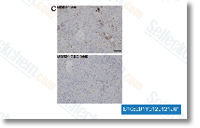As such, the TCGA data signify a fantastic supply for that generation of novel hypotheses and a few accessibility to constrained retrospective clinical data which might be accessed by the cBio net portal. This data portal has become constructed to allow all investigators, such as individuals not employed to managing and analyzing higher dimensional information, to easily interrogate genes and pathways of curiosity. On the other hand, the retro spective nature on the TCGA task and its utilization of tumors not always linked to specic clinical trials, through which the outcome of therapy can be assessed rigorously, limit the potential of your TCGA to establish whether the genomic data can predict the action on the existing treatment standards.
Nevertheless, the MLN0128 solubility TCGA project offers a blueprint that in some type ought to be a part of the molecular analyses linked to investigational clinical trials with novel drugs and combinations, particularly wherever a diagnostic biomarker for patient selection is lacking. Ultimately, Nik Zainal and colleagues sequenced the comprehensive genome of 21 breast cancers. These authors identied driver mutations in lots of in the genes described over, however the major contribution of these articles or blog posts was to make use of total genome information to elucidate muta tional processes in breast cancer. Indeed, they identied not less than ve dierent mutational processes, which include C T mutations at TpCpX tri nucleotides. Clustering from the samples based mostly on these mutational processes identied two important groups, separated by BRCA1/BRCA2 status. The signicant heterogeneity in the mutational processes taking place in breast cancer suggests similar heterogeneity while in the defects in restore mechanisms in these tumors.
With the improvement of PARP inhibitors, defective DNA restore mechanisms are emerging as therapeutic Roscovitine CYC202 targets. Exploitation of such targets in breast cancer will need the identication of the defective processes underlying each and every of those ve categories plus the development of medicines that target these alterations. These landmark studies just about every catalogued the molecular lesions in breast cancer by utilizing dierent sets of patients, technologies, and techniques of evaluation. Novel insights gleaned from these data in to the pathogenesis of breast cancer are going to be essential for our understanding in the standard biology of this  sickness. Having said that, what does this imply for breast cancer individuals seeking regular care or even a clinical trial or the two Do the outcomes of these studies and the massive amount of information created portend novel therapies that can modify the purely natural historical past from the disease It is relatively reassuring, but not surprising, that striking similarities in recurrently mutated or altered genes had been identied between the research.
sickness. Having said that, what does this imply for breast cancer individuals seeking regular care or even a clinical trial or the two Do the outcomes of these studies and the massive amount of information created portend novel therapies that can modify the purely natural historical past from the disease It is relatively reassuring, but not surprising, that striking similarities in recurrently mutated or altered genes had been identied between the research.
Ras Signal
RAS is a fairly simple protocol composed of just a few messages.
